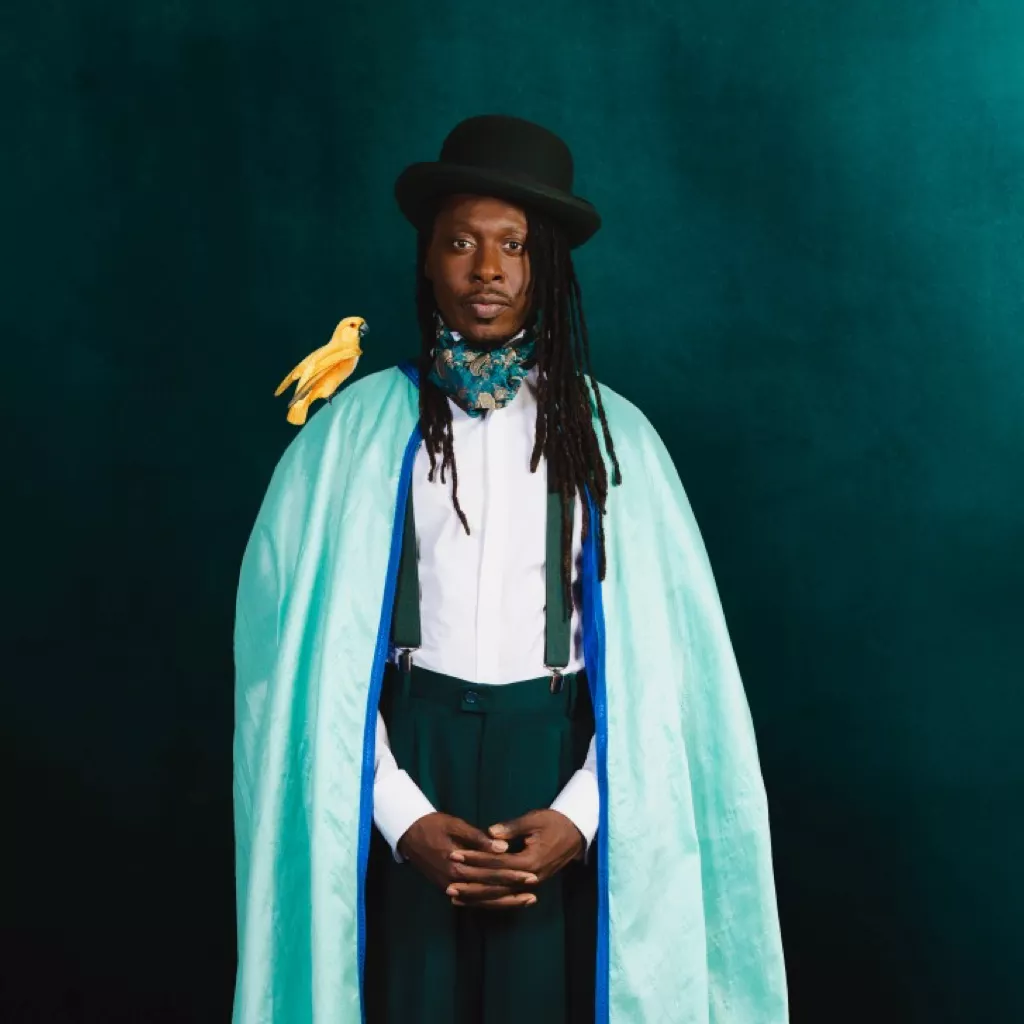
FAADA FREDDY
With Golden Cages, Faada Freddy finally breaks a long silence in his discography. It has been seven years since the Senegalese singer last released Gospel Journey. That first album had earned him unanimous praise from the press, a nomination at the Victoires de la Musique in 2016, and his consecration as a live performer over nearly 300 concerts, mostly in Europe and the United States. Then, the arrival of the pandemic provided the opportunity for a pause, where he could recharge and write new songs… “I took advantage of this forced break to meet other musicians. These exchanges helped me evolve and expanded my approach to composition.”
That said, this new album continues where the first one left off. In keeping with the concept behind Gospel Journey, the album’s only instruments are voices, hand claps, and body percussion. All the rhythms, instrument sounds were created using the mouth or the body, an approach diametrically opposed to modern recording methods dominated by computers and software. Faada’s voice is bolstered by a vocal quintet including Manu Vince, Marion Cassel, Philippe Aglaé, Jean Marc Lerigab, and Martin Gamet, each with their own distinct register and tone, resulting in overall harmonic richness and warmth. “My music is 100% organic, of human origin, and 0% technological in origin,” Faada states, also adding: “while this aesthetic is borrowed from gospel proper, on the other hand, the music belongs to the pop-soul genre.”
Gospel Journey primarily consisted of adaptations of songs drawn from various styles: soul, folk, indie rock or R’n’B. On the other hand, Golden Cages presents original tracks that Faada has written, composed and produced in an act of absolute freedom. Of “non-servitude,” one could say, given that the title track seems so deeply indebted to La Boétie’s infamous Discourse on Voluntary Servitude… “We live in a society based on the standardization of thought, on acceptance, submission,” muses the singer. “Artificial intelligence makes us slide little by little towards an absence of reflection at the risk of a generalized dehumanization. We neglect our intellectual and cognitive abilities. We allow ourselves to be imprisoned in what I call ‘golden cages’.” And Golden Cages’ non-artificial approach acts as a response to this complacency with the loss of freedom.
Following in the footsteps of soul and reggae street philosophers like Curtis Mayfield, Marvin Gaye, or Bob Marley, whose voices rocked his childhood, Faada advances a way of thinking that is both critical and benevolent throughout. Thus in “Truth And Lies”, he insists on the need to remain vigilant with regard to the often toxic flow of information disseminated by the media and social networks. Where, in “Happy Together,” he pleads for unity in all circumstances, in the construction of a project, a family, a people.
In “Aladdin” he dreams of being the hero of the Thousand and One Nights, inviting anyone, without social, religious or ethnic distinction, to join him on his flying carpet. “My magic carpet is music. All passengers are equal. There is no first or second class, no dogmas, no prejudices.” For him, freedom can only exist by combining consciousness with emotion, reflection with wonder. And that’s what the sunny fun of “So Amazing”, the poetic reverie of “Beautiful” stem from. As well as the gentle harshness of “Day To Day Struggle”, which brings the listener back to Earth, a vision of reality also present in “Tables Will Turn”: “Quand tous tes rêves semblent se dissoudre dans un nuage de confusion, rappelle-toi que c’est juste un orage qui passe.” (When all your dreams seem to dissolve in a cloud of confusion, remember that it’s just a passing storm.) Thus, from a wisdom acquired through experience, he draws a universal lesson, echoing the words of his compatriot, the writer Mohamed Mbougar Sar: “Aucune blessure n’est unique. Rien d’humain n’est unique.” (No injury is unique. Nothing human is unique.)
The album’s first single, “Tables Will Turn,” refers to the ability to face life’s challenges with resilience. But, in the final part, it also throws back to Faada’s years as a rapper; back in the 90s, along with N’Dongo D he formed Daara J Family, a famous member of Dakar’s hip-hop scene. “Yes, I’m a soul singer, but I can also rap. That’s the message.” While the spirit and creation of the album cannot be confined within any single community, the African roots of the singer are no less celebrated. Personifying Africa in “Africa Nangadef”, he asks the mother continent to smile at him as a sign of hope. While “Massilo”, sung in Wolof, is based on the ngoyane tradition, a style used by ancient griot storytellers, as a reminder of his attachment to the land where he was born. Here the emotional impulse is heightened by a responsibility: every African artist has to represent his country and his continent. Golden Cages, in its shimmering musical richness, is above all a vibrant love song to freedom, and an ode to overcoming divisions through harmony.

